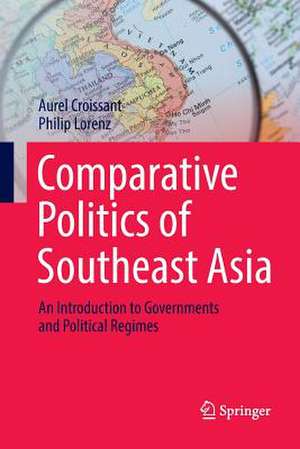Comparative Politics of Southeast Asia: An Introduction to Governments and Political Regimes
Autor Aurel Croissant, Philip Lorenzen Limba Engleză Paperback – 6 iun 2019
Preț: 460.77 lei
Nou
Puncte Express: 691
Preț estimativ în valută:
88.23€ • 91.01$ • 73.12£
88.23€ • 91.01$ • 73.12£
Carte tipărită la comandă
Livrare economică 21 februarie-07 martie
Preluare comenzi: 021 569.72.76
Specificații
ISBN-13: 9783319885599
ISBN-10: 3319885596
Pagini: 442
Ilustrații: XX, 442 p. 40 illus., 1 illus. in color.
Dimensiuni: 155 x 235 x 24 mm
Greutate: 0.64 kg
Ediția:Softcover reprint of the original 1st ed. 2018
Editura: Springer International Publishing
Colecția Springer
Locul publicării:Cham, Switzerland
ISBN-10: 3319885596
Pagini: 442
Ilustrații: XX, 442 p. 40 illus., 1 illus. in color.
Dimensiuni: 155 x 235 x 24 mm
Greutate: 0.64 kg
Ediția:Softcover reprint of the original 1st ed. 2018
Editura: Springer International Publishing
Colecția Springer
Locul publicării:Cham, Switzerland
Cuprins
Government and Political Regimes in Southeast Asia: An Introduction.- Brunei Darussalam: Malay Islamic Monarchy and Rentier State.- Cambodia: From UN-Led Peace-Building to Post-genocidal Authoritarianism.- Indonesia: Challenges of Conflict and Consensus in the Era of Reformasi.- Laos: The Transformation of Periphery Socialism.- Malaysia: Competitive Authoritarianism in a Plural Society.- Myanmar: The Challenging Transition from Military to Democratic Government.- Philippines: People's Power and Defective Elite Democracy.- Singapore: Contradicting Conventional Wisdom About Authoritarianism, State and Development.- Timor-Leste: Challenges of Creating a Democratic and Effective State.- Vietnam: The Socialist Party State.- Conclusions: Comparing Governments and Political Institutions in Southeast Asia.
Notă biografică
Aurel Croissant is professor of political science at Heidelberg University, Germany. His main areas of research include comparative politics of East and Southeast Asia, democratization studies, civil-military relations, conflict studies and comparative auhoritarianism. He has twenty years of experience in teaching undergraduate, graduate and doctoral courses in Germany, the USA and several Asian countries. He has published more than ten books, co-edited about 20 volumes and special issues, and published about 150 articles in journals such as Democratization, Party Politics, Japanese Journal of Political Science, Journal of East Asian Studies, Contemporary Southeast Asia, Pacific Review, Asian Journal of Political Science, Electoral Studies, and European Political Science Review. His publications appeared in English, German, Korean, Spanish, Indonesian and Russian. He is co-editor of the journal Democratization (with Jeffrey Haynes).
Philip Lorenz is lecturer and researcher in political science at Heidelberg University, Germany. In his research, he studies processes of democratization and democratic consolidation with a focus on the role of civil-military relations. His further research areas include political violence and popular mobilization in authoritarian regimes, and young democracies. His regional specialty is Southeast Asia. He has taught introductory courses to political science, advanced courses on different aspects of democratization in Southeast Asia as well as on historical and current processes of state-building worldwide. In his dissertation, he analyzed the impact of civil society organizations on the institutionalization of civilian control over the military in Indonesia’s young democracy.
Textul de pe ultima copertă
This textbook provides a comprehensive introduction to the political systems of all ASEAN countries and Timor-Leste from a comparative perspective. It investigates the political institutions, actors and processes in eleven states, covering democracies as well as autocratic regimes. Each country study includes an analysis of the current system of governance, the party and electoral system, and an assessment of the state, its legal system and administrative bodies. Students of political science and regional studies will also learn about processes of democratic transition and autocratic persistence, as well as how civil society and the media influence the political culture in each country.
Caracteristici
Provides an introduction to the political systems of all ASEAN countries Illustrates political institutions, actors and processes in eleven states Each country study includes an analysis of the political parties, legal system, state and administration, civil-military relations, civil society and political culture, as well as the media
